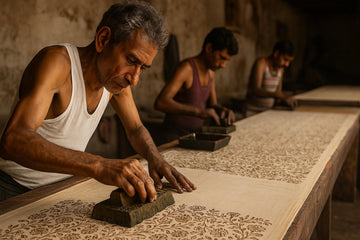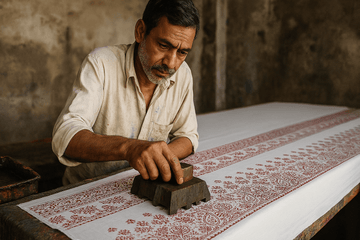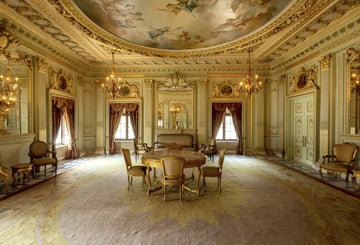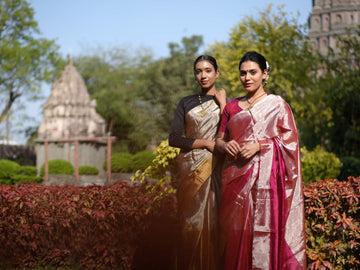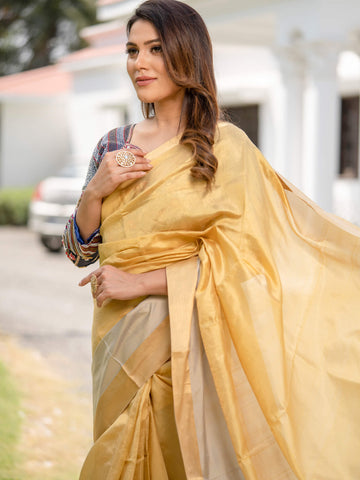
Welcome to the world of Maheshwari handloom sarees, the epitome of elegance and grace! Maheshwari sarees have a rich history dating back to the 18th century when they were first designed by the legendary queen, Maa Ahilya Bai Holkar for her royal guests. Today, they are one of the most popular sarees in India, known for their exquisite designs and superior quality.
So, what makes Maheshwari sarees so special? Let's delve into their fascinating story and discover the legacy they carry with them.
Origin of Maheshwari Handloom Sarees
Maheshwari sarees owe their origin to the small town of Maheshwar, located on the banks of the Narmada River in Madhya Pradesh. It was here that Maa Ahilya Bai Holkar, the queen of the Holkar dynasty, gave birth to the idea of creating a saree that would be lightweight, easy to wear, and yet exude royal elegance.
Maa Ahilya Bai Holkar's Inspiration
Maa Ahilya Bai Holkar was a visionary queen who had a keen eye for design and aesthetics. She drew inspiration from the intricate carvings and motifs that adorned the walls of the Maheshwar fort and temples. She wanted to capture the essence of these designs in a saree that would be both functional and fashionable.
Designing the First Maheshwari Saree
Being a prominent kingdom of central India and due to connections with Shivaji's Maratha empire, royal guests often used to visit Maheshwar - Maa Ahilya Bai's capital. On one such occassion, Rajamata thought of surprising the royal guests with gifts that would reflect the heritage of Maheshwar. She got a brilliant idea and brought in expert weavers from Surat and Mandu to create the first set of Maheshwari handloom sarees with unique designs that incorporated elements from the local architecture and art. The borders of the saree were adorned with intricate patterns and the pallu featured a bold design that was sure to make a statement. They were called Garbh Reshmi sarees.
The Garbh Reshmi sarees were crafted with a unique technique that involved weaving silk and cotton together to create a lightweight and comfortable fabric. These sarees were highly valued and worn exclusively by the royal families and the nobility of the Holkar dynasty. The term "Garbh Reshmi" translates to "silk from the womb" and refers to the high-quality silk that was sourced from the cocoons of a particular breed of silkworms.
The Garbh Reshmi sarees were adorned with intricate designs and motifs that were inspired by the architecture and art of Maheshwar. The borders of the sarees featured geometric patterns and the pallu was adorned with intricate designs that often included peacocks, elephants, and other animals. The colors used in these sarees were vibrant and bold, with shades of red, green, and gold being the most popular.
Over time, the technique of weaving Garbh Reshmi sarees became less popular and was replaced with the use of pure silk and cotton fabrics. However, the legacy of these sarees continued, and the intricate designs and motifs used in Garbh Reshmi sarees continue to inspire the modern-day Maheshwari sarees that we see today.
The Garbh Reshmi sarees played a significant role in the history of Maheshwari sarees. They were a symbol of status and luxury and represented the rich cultural heritage of the Holkar dynasty. The intricate designs and motifs used in these sarees continue to inspire the modern-day Maheshwari sarees and are a testament to the creativity and innovation of the weavers of Maheshwar.
The Legacy of Maheshwari Handloom Sarees
Maheshwari sarees soon became a symbol of status and luxury. They were worn by the royals and the nobility, and were considered a prized possession. The sarees were also gifted to visiting dignitaries as a mark of respect and hospitality.
Over time, the Maheshwari saree evolved to suit the changing fashion trends. The cotton saree was replaced with silk and the designs became more elaborate and ornate. Today, Maheshwari sarees are known for their unique blend of traditional and contemporary design elements.
Designs of Maheshwari Handloom Sarees
Maheshwari sarees feature a range of designs, from simple and elegant to bold and intricate. The borders of the saree are typically adorned with geometric patterns or floral motifs, while the pallu features a larger design that may include peacocks, elephants, or other animals.
One of the unique features of Maheshwari sarees is the use of the 'chanderi' technique, which involves weaving silk and cotton together to create a lightweight fabric that is both comfortable and elegant. The sarees are also known for their distinctive colors, which range from bright and bold to subtle and muted.
Maheshwari Handloom Sarees Today
Today, Maheshwari sarees are popular across India and around the world. They are worn for a variety of occasions, from weddings and festivals to formal events and everyday wear. The sarees are admired for their exquisite craftsmanship, unique designs, and the legacy they carry with them.
In conclusion, Maheshwari handloom sarees are a testament to the rich cultural heritage of India. They embody the spirit of creativity and innovation, and are a tribute to the vision of the legendary queen, Maa Ahilya Bai Holkar.





